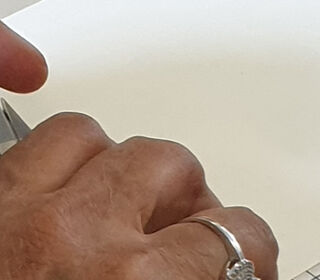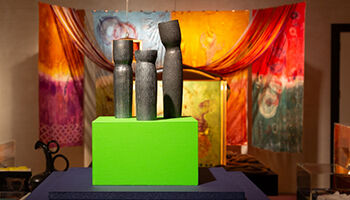
Blog Article

Exploring and addressing inequalities in craft
Dr Karen Patel has highlighted the extent of racism and microaggressions in UK professional craft and is working with organisations across the craft sector to make craft more inclusive
Researcher
Research beginnings – the challenges of social media in craft
Karen’s research in this area began in 2018, and was made possible by three consecutive Arts and Humanities Research Council funded fellowships, all in collaboration with Crafts Council. The first project, a Creative Economy Engagement Fellowship, explored the opportunities and challenges of social media for individual makers in craft.
Karen ran two knowledge exchange workshops, one in Birmingham, one in London, for women from culturally diverse backgrounds working in craft. The workshops teased out the key barriers and challenges for participants, including concerns about cultural appropriation of their work, potential copyright issues, and having the time to use social media, alongside making.
Karen also co-produced the ‘Maker Stories’ video series produced for the Crafts Council website as part of their business development programme, where makers offer their top tips for using social media. You can view one of the videos, featuring silk scarf designer Arati Devasher.
Revealing lived experiences of racism in craft
The second project was a larger, 2-year AHRC/RCUK Innovation Fellowship, called Craft Expertise, also in collaboration with Crafts Council. This research focused on inequalities in UK professional craft, and involved interviews with makers from minoritised groups, mainly women from culturally diverse backgrounds, around the UK.
Karen established a network and brought people together from around the UK in the project’s first conference, at STEAMhouse in December 2019. The event brought together makers, researchers and organisations such as the Arts Council and Applied Arts Scotland to share work and knowledge. The keynote was by Deirdre Figueiredo, CEO of Craftspace in Birmingham.
The Crafts Council’s Business Development Team also offered free advice surgeries for makers throughout the day. Below is Karen on a panel with makers Majeda Clarke, Lorna Hamilton Brown and Jeanette Sloan discussing inequalities in craft, chaired by project mentor Prof Rajinder Dudrah.
Karen’s research revealed the extent to which the makers experienced racism and microaggressions at all stages of their craft career, and throughout the craft sector, including at fairs, studios, and in dealing with suppliers. Some of these experiences are told by makers in the ‘Maker Stories’ podcast series. You can listen to episode 1, with Jasmine Carey.
Karen worked with makers, Crafts Council, Craftspace in Birmingham, and colleagues at STEAMhouse on a ‘Steam sprint’ workshop series. Using the research as a starting point, participants worked through tailored design thinking activities to produce recommendations for craft organisations to make craft spaces more inclusive.
Making changes in craft
These recommendations were published in Karen’s report for the Crafts Council, Making Changes in Craft. The report has informed Crafts Council’s Toolkit for Change, for craft organisations to address inequalities in craft and become more inclusive for all.
Karen’s research has been central to Crafts Council’s efforts to become an anti-racist organisation. She spoke at Crafts Council’s open forum on racism in craft with Jay Blades from The Repair Shop and Dr Rose Sinclair from Goldsmiths. She was a founding member of the Crafts Council’s Equity Advisory Council, which was established to advise the Crafts Council and encourage the organisation to reflect and take action to become an anti-racist organisation.

Karen also commissioned work for the We Gather Exhibition, which was held at the Crafts Council Gallery during 2021 and 2022, to celebrate the work of culturally diverse makers in the UK and around the world, and raise awareness of the issues of inequalities in craft raised in Karen’s research.
Karen’s research also provided the context for the Crafts Council’s successful funding application to the Centre for Cultural Value, for the project ‘Disrupting the craft canon’, which explored hierarchies of value in craft.
International perspectives and alternative pathways in craft
Karen then expanded her work after a successful follow-on funding application to the AHRC/RCUK Innovation Fellowships scheme, allowing her to carry out this research for a further 2 years. In this phase, the focus shifted to alternative pathways into craft, and international perspectives. This involved a trip to Australia in November 2022, where Karen visited craft social enterprises in Melbourne and Adelaide, and presented her work at Monash University. During the trip Karen produced another podcast series, ‘Craft Expertise: The View From Australia’, highlighting the Australian perspective on inequalities in craft, and exploring how craft social enterprises foster equity and inclusion in their work. Listen to episode 1, an interview with Professor Susan Luckman from University of South Australia.
Karen’s social enterprise case studies have been written up into a toolkit for the Crafts Council, which includes further practical recommendations for craft organisations to become more inclusive.
The research has been published in a Special Issue for the European Journal of Cultural Studies, ‘Craft Economies and Inequalities’, co-edited by Karen and Rajinder Dudrah. The special issue was launched at the Craft Expertise final project event in March 2023, where the Crafts Council also talked about the impact of Karen’s research on their work, and the progress on their ‘disrupting the craft canon’ project. You can watch all videos from the event on the Craft Expertise website.
As well as her work with the Crafts Council, Karen is also an advisory board member for the Goldsmiths Company and the Goldsmiths Trust Ethical Making Project in Scotland.
Look out for Karen’s forthcoming book, Craft as a Creative Industry, to be published in 2024 by Routledge.
To find out more, visit the Craft Expertise website.